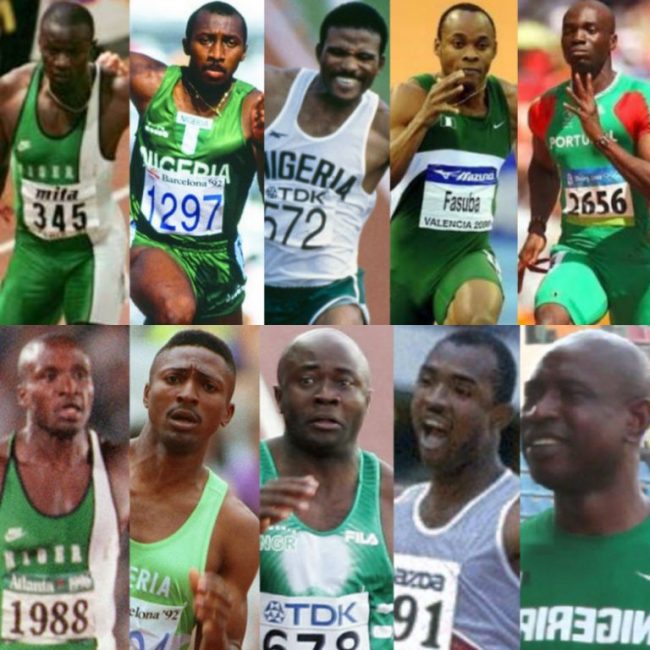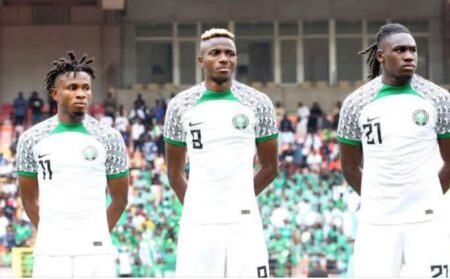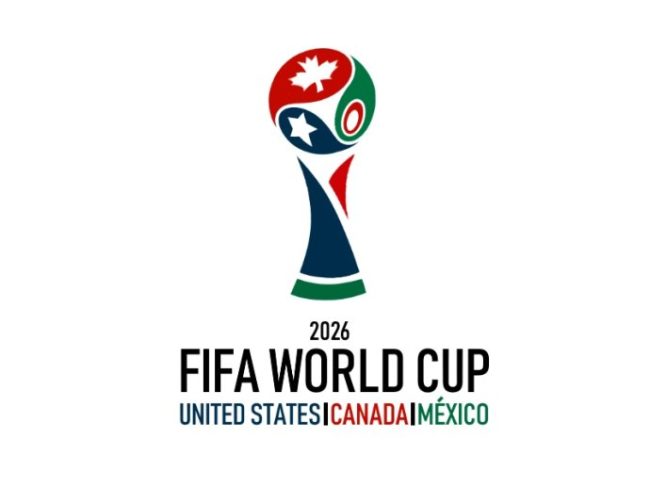Who is the greatest male athlete Nigeria has ever produced? The answer will undoubtedly be policeman Sunday Olanrewaju Bada!
Bada’s choice is based solely on the worldwide criteria of using honours earned at major global events followed by records set and quality of performances.
There are however nine other athletes who have done exceptionally well for Nigeria who deserve to be ranked among the greatest athletes Nigeria has produced. Complete Sports’ DARE ESAN takes you down memory lane as he x-rays the global achievements of each of the 10 athletes chosen here as Nigeria’s greatest of all time. Note that relay performances are only complementary here as athletes are first measured based on their individual performances and not on team effort…
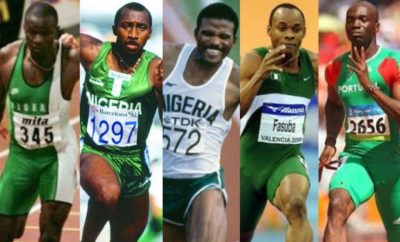
Sunday Olanrewaju Bada (400m)
Now late Sunday Bada was the most decorated Nigerian male athlete living or dead. He was the only man who won medals at all major global
Championships/Games and the only one to be crowned champion.
He began his journey to immortality in Havana,Cuba at the World (Continental) Cup where he won the 400m gold and helped the African team to a gold medal finish in the 4x400m relay.
The following year he raced to the podium again, this time at the Sky Dome in Toronto,Canada where he won a silver medal at the World Indoor Championships to become the first and only Nigerian man to win a 400m indoor medal.
He repeated his silver medal finish two years later in Barcelona, Spain before defying the odds and a certain Jamie Baulch (who was undefeated all-season before coming into the championships) to become the first Nigerian to be crowned World (Continental) Cup champion!.
He set a new 45.51 seconds Nigerian and African record on his way to that historic feat. The record still stands till today.
Bada was instrumental to Nigeria’s 4x400m bronze medal win at the World Championships in 1995 in Sweden where he took the baton in seventh place and overhauled three athletes in front of him to race home third.
He was also in the team that won Nigeria’s first ever Olympic relay gold medal at the Sydney games in 2000.His 44.63 seconds personal best is the ninth fastest time over the full lap race by a Nigerian. Only Innocent Egbunike ran faster than the brave Policeman who died in December 2011.
Also Read: Nigeria’s Most Valuable Eleven In 2019/20 Season Worth €154m
Innocent Egbunike (400m)
Regarded as one of the greatest quartermilers in the African continent, Egbunike was Nigeria’s brightest star over the 400m especially in the 1980s where he became the first Nigerian to win a track medal at the World Championships. He achieved this feat courtesy his silver medal finish in Rome,Italy at the second edition of the competition in 1987.
The 1987 African Games champion was actually one of the overwhelming favourites for the gold after winning nine of 16 races in the American and European circuit and running a 44.17 seconds personal best which ranked second behind Butch Reynolds’ 44.10 seconds prior to the championships. He also ran the fastest time (44.26) in the semi-finals but surprisingly lost to Thomas Schonlebe in the final.
Egbunike’s 44.17 seconds personal best was a Nigerian and African record at the time and is still a Nigerian record till today. He owns nine of the 10 fastest times ever recorded by a Nigerian in the event.
Egbunike was also a member of Nigeria’s 1600 relay team that won Nigeria’s first medal at the Olympics courtesy their bronze medal finish inside the Memorial Coliseum in Los Angeles, California,USA in 1984.
He was a bronze medallist in the 400m at the World (Continental) Cup in Canberra,Australia in 1985.
Ajayi Agbebaku (Triple Jump)
Fresh from his conquest at the World University Games in Edmonton, Canada where he hopped,stepped and jumped to a new 17.26m Nigerian nay African record in the triple jump on his way to winning the gold, Agbebaku made history a month later in Helsinki,Finland where he became the first Nigerian nay African man to win a field event medal at World Athletics’ flagship event,the World Championships.
Agbebaku’s 17.18m jump fetched him an historic bronze medal,the first individual medal by a Nigerian in the history of the championships.
He began his journey to the record books in May of that year when he became the first Nigerian nay African man to hit the 17m mark in the history of the event. His 17.05m jump was a Nigerian and African record at the time. This he improved to 17.26m in Edmonton and it is still the best mark ever achieved by a Nigerian 37 years after!
African champions in the triple and long jump in 1979, Agbebaku’s bid to transfer his historic achievement to the Olympic stage failed to materialise as he could only finish seventh at the Los Angeles Games in 1984.
He was also a finalist in the event at the IAAF World Cup in Athletics in 1979 (Montreal,Canada) and 1981 (Roma,Italy).
Olusoji Adetokunbo Fasuba (100m)
One of the greatest sprinters to ever come out of Africa, Fasuba is the reigning African record holder in the men’s 100m (9.85 seconds) and was crowned a world (continental) champion in 2008 after becoming the first and so far only Nigerian man to win a sprint title at the IAAF World Indoor championships.
A finalist two years earlier in Moscow, Russia, Fasuba ensured Nigeria’s national anthem was sung for the second time in the history of the championships 11 years after Sunday Bada made history as the first Nigerian man to win a World Indoor title.
That same year, Fasuba made history as the first African man to win the 100m title at the African Championships three consecutive times.
Also Read: 5 Greatest Nigerian Female Athletes In History
Four years before his history-making feat in Valencia, Fasuba went,saw and returned with a bronze medal as a member of Nigeria’s 4x100m team to the Olympic Games in Athens,Greece. He clearly is not the first man to run in the finals of the blue ribband event at World Athletics’ flagship event,the World Championships, but this Ekiti State-born sprinter achieved the best result in the final of the event courtesy his fourth place finish in Osaka,Japan in 2007.
Francis Obikwelu (200m)
Obikwelu may have reserved his best for his adopted country,Portugal after switching allegiance soon after the Sydney 2000 Olympics,the quartermiler turned sprinter nonetheless carved indelible niches for himself in the colours of Nigeria.
He started with his double sprint conquest at the World Junior championships in 1996 in Sydney, Australia where he became the second man after Ato Boldon and first and only Nigerian nay African man to successfully complete a sprint double.
He graduated to the senior team the following year and was a member of the Nigerian 4x100m team that set a new 37.94 seconds African record on the way to winning a silver medal at the World Championships in Athens,Greece.
Earlier in the winter of that year, the lanky Obikwelu was at the Palais Omnisports in Paris, France where he won a bronze medal in the 200m at the World Indoor Championships.
In 1999,he made history as the first Nigerian man to win an individual sprint medal in the history of the World Championships when he raced to a bronze medal finish at the seventh edition of the championships in La Cartuja, Sevilla, Spain.
He had earlier made another piece of history in the semi-final of the race as the first Nigerian man and second African behind Frankie Fredericks to run a sub-20 seconds over the 200m.His 19.84 seconds run which sent fears into the camp of the Americans,especially then
reigning 100m world champion,Maurice Green who was eyeing a sprint double in Sevilla was a Nigerian record for 20 years.
That feat also ensured he became the first and so far only Nigerian man to win individual medals at the World Championships indoors and out.
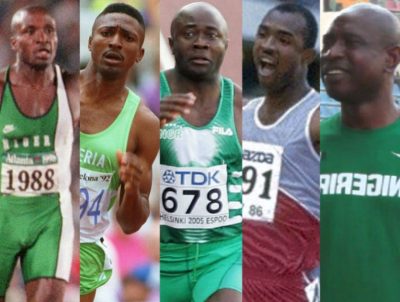
Davidson Ezinwa (100m)
Davidson rose from a World Junior champion in 1990 to become one of the finest and quickest sprinters Nigeria has ever seen. He showed signs of becoming the next big thing to come out of Nigerian athletics at the Commonwealth Games trial in Bauchi in 1990 where he ran 10.05 seconds to win. At the same competition competition he ran 20.30 seconds over the 200m which ensured Nigerians took proper notice of his immense talent.
Davidson continued to grow from there and was a member of Nigeria’s 4x100m team that won a silver medal at the 1992 Olympics in Barcelona in a new 37.98 African record. He was also in the relay team that picked another silver medal,this time at the 6th IAAF World Championships in Athens,Greece in 1997 after setting a new 37.94 seconds African record in the semifinals.
Davidson is on record as the second Nigerian man to break 10 seconds in the 100m courtesy his 9.96 seconds run in April,1992 and he set a new Nigerian record of 1994 two years later that stood for four years.
His only global individual medal came at the World Indoor championships in Paris where he ran 6.52 seconds to place third in
the 60m.
Olapade ADENIKEN (100m)
Adeniken is the first Nigerian to break 10 seconds in the 100m when he ran 9.95 seconds in April 1992 to set a Nigerian record that stood for just two years.
He was a member of the 4x100m relay team that won a silver medal at the 1992 Olympic Games in Barcelona as well as the team that won a World championships silver in 1997 in Athens, Greece.
The first Nigerian sprinter to successfully complete a sprint double at the National Collegiate of Athletics Association (NCAA) Championships, Adeniken won individual medals at the World (Continental) Cup in 1989 (200m bronze),1992 (100m silver) and 1994 (100m silver) in addition to two 4x100m relay medals (silver in 1994 and bronze in 1989).
He was a finalist in the 100m and 200m at the 1992 Barcelona Olympics.
Uchenna Emedolu (100m)
The first Nigerian man to win a sprint title at the World (Continental) Cup, the Agulu-born Emedolu achieved fame and success on the track after he was convinced to leave football for the tartan track.
Emedolu’s first global success came in the 100m final at the 2002 IAAF World (continental) Cup in Athletics in Madrid where he ran 10.06 seconds in pouring rain to make history.
He was also in the African 4x100m relay team that won a bronze medal at the same competition in Madrid. In 2004, Emedolu made his Olympics debut in Athens and was a member of the 4x100m team that finished third in the final of the event at the Olympic Stadium.
Chidi Imoh (100m)
Regarded as the greatest sprinter in Nigeria in the 1980s and early 1990s, Imoh was a silver medal winner at the 1992 Olympics in Barcelona where he ran the second leg for the 4x100m relay team after stumbling at the semi-final stage of the 100m event days earlier.
He won a 60m bronze at the World Indoor Championships in Sevilla, Spain in 1991 and held the Nigerian 100m record at 10.00 seconds for six years (1986 to 1992) before Olopade Adeniken broke it in 1992.He held the Nigerian 60m indoor record between February 1988 when he ran 6.57 seconds (later improved to 6.52 in 1990) and January 1999 when Davidson Ezinwa ran 6.51 seconds in Chemnitz, Germany.
He was also a World (Continental) Cup medallist courtesy his silver medal win in Canberra,Australia in 1985.
Yusuf Ali (Long Jump)
Fondly called Skippo by friends and admirers,Ali is arguably the greatest long jumper Nigeria has ever seen. He came at a time Nigeria was a force to reckon with globally in the horizontal jump but was able to visibly distinguish himself at the long jump pit where his 8.27m leap at the National stadium in Surulere, Lagos in 1989 remains the best mark ever set by a Nigerian in event.
He may not be the first Nigerian to hit the 8m mark,that honour belongs to Charlton Ehizuelen who hit 8.08m in April 1977 and is also arguably considered as Nigeria’s greatest long jumper of all time,Ali however owns four of the 10 best marks set in the Nigerian all-time list and has hit the 8m mark 13 times in his career.
Ali also made his mark at the biggest athletics stages in the world,the Olympics and the World championships.
He was a finalist at the World Championships in Helsinki,Finland in 1983,finishing eighth. The following year he made it to the final at the Los Angeles Olympics but could only finish outside top eight (9th). He however won his only individual global medal at the World (Continental) Cup in 1989, finishing second.


